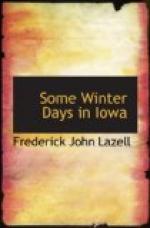Title: Some Winter Days in Iowa
Author: Frederick John Lazell
Release Date: April 14, 2006 [EBook #18174]
Language: English
Character set encoding: ASCII
*** Start of this project gutenberg EBOOK some winter days in Iowa ***
Produced by Brian Sogard, Richard J. Shiffer and the
Online
Distributed Proofreading Team at http://www.pgdp.net.
Some Winter Days in Iowa
By
Frederick John Lazell
Cedar Rapids, Iowa
the torch press
Nineteen hundred seven
Copyright, 1907
by
Fred J. Lazell.
1907
FOREWORD
I am glad to have the privilege, thus in advance, of looking over Mr. Lazell’s delightful essays. He has surely a gift in this sort of thing. We are grateful to the man who shows us what he sees in Nature, but more to the man who like our present author shows us how easy and blessed it is to see for ourselves.
Mr. Lazell reminds me of Thoreau and Emerson, and I can suggest no better foreword than the passage from the last named author, from the Method of Nature, as follows:
“Every earnest glance we give to the realities around us with intent to learn, proceeds from a holy impulse and is really songs of praise. What difference can it make whether it take the shape of exhortation, or of passionate exclamation, or of scientific statement? These are forms merely. Through them we express, at last, the fact that God has done thus or thus.”
ThomasH. MACBRIDE
Iowa city, Iowa
October 17, 1907
I. THE WOODLANDS IN JANUARY
Humanity has always turned to nature for relief from toil and strife. This was true of the old world; it is much more true of the new, especially in recent years. There is a growing interest in wild things and wild places. The benedicite of the Druid woods, always appreciated by the few, like Lowell, is coming to be understood by the many. There is an increasing desire to get away from the roar and rattle of the streets, away from even the prim formality of suburban avenues and artificial bits of landscape gardening into the panorama of woodland, field, and stream. Men with means are disposing of their palatial residences in the cities and moving to real homes in the country, where they can see the sunrise and the death of day, hear the rhythm of the rain and the murmur of the wind, and watch the unfolding of the first flowers of spring. Cities are purchasing large parks where the beauties of nature are merely accentuated, not




